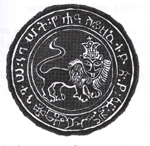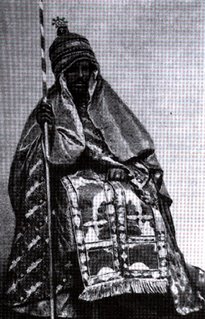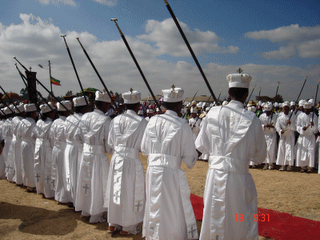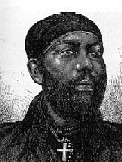
BBC's Current Timeline for Ethiopia
1868 - Tewodros defeated by a British expeditionary force and commits suicide to avoid capture.
1872 - Tigrayan chieftain becomes Yohannes IV.
1889 - Yohannes IV killed while fighting Mahdist forces and is succeeded by the king of Shoa, who becomes Emperor Menelik II.
1889 - Menelik signs a bilateral friendship treaty with Italy at Wuchale which Italy interprets as giving it a protectorate over Ethiopia.
In between 1872 and 1889, there are so many battles, treaties, and undocumented negotiations that occured between Ethiopians, the British, the Italians, the Egyptians, the Muslims in Sudan.
In between 1872 and 1889, the British tried to colonize Ethiopia through the Italians who were their ally; so that the French, who were nearby in Djibouti, could not gain Ethiopia and its resources.
Let's not take history as it is given to us; let's investigate our true past and bring it to the light.
1855 TO 1868, EMPEROR TEWODROS RULED IN HIS CAPITAL MAGDALA•Tewodros arrested and refused to release imprisoned British subjects
•Early 1868, the British force seeking Tewodros’ surrender, arrived on the coast of Massawa
•The British wanted to pass through Tigray to go to Tewordros’ capital Magdala, so they offered Dajazmach Kassa of Tigray money and weapons to pass
•Tigray Tewodros (emperor from 1855 to 1868) died in 1868
•British completed their mission and were leaving the country, they rewarded Kassa for his cooperation with artillery, muskets, rifles, and munitions, all in all worth approximately £500,000
THE NEXT EMPEROR•Menelik, escaped from Tewodros’ imprisonment in 1865 after Tewodros died and with the support of family and friends, he became the ruler of the province of Shewa.
•Wagshum Gobaze ruler of Amhara, Wag, and Lasta occupied Gondar and crowned himself Emperor Tekle Giyorgis II. No one took his coronation seriously because there was no abun
•July 1871, Emperor Tekle Giyorgis II, attacked Kassa at his capital in Adwa, for Kassa had refused to pay tribute. Although Kassa’s army was outnumbered 12,000 to the emperor’s 60,000, Kassa’s army was equipped with more modern weapons (given by the British) and better trained. At battle’s end, forty percent of the emperor’s men had been captured. The emperor was imprisoned and would die a year later.
•21 January 1872, Dajazmach Kassa Mercha of Tigray became the new emperor under the name Yohannes IV
 YOHANNES' RULE
YOHANNES' RULE•1874, an Egyptian army captured the Ethiopian cities of Bogos and Keren, both near the Sudanese border.
•The Egyptians had also occupied the port of Zula and all ports south of the Massawa, establishing an embargo preventing import of weapons into Ethiopia
•1875, the Egyptians took Harar.
•Yohannes had tried to appeal to European leaders but was completely ignored because Egypt was economically superior
•23 October 1875, Yohannes declared war on the Egyptians
•November 1875, the Egyptian army met Yohannes’ well-prepared troops at Gundat. The Egyptian army lost one-third of its men, including their commander.
•1876, The Egyptians returned 4 months latter with a better-equipped army, numbering 15,000 – 20,000 (Henze, P. 2000, 147-8). The three-day battle in March of 1876 in Gura left all but 500 Egyptians dead, wounded, or captured. Yohannes was also able to confiscate “12,000-13,000 Remington rifles, sixteen cannons, munitions, and other … booty.” (Marcus, H 2002, 75).
•Both countries attempted to come to a diplomatic solution.
•At the same time, Egypt was breaking apart internally and in northern Sudan, which had been part of Egyptian territory
•A Muslim Mahdist movement had broken out and replaced Egyptian authority as well as emerge as a threat to Ethiopia
•1884, British came to Egypt’s defense in 1884 and made an arrangement: a treaty known as the Adwa (or Hewett) Peace Treaty. According to the treaty, Egypt would give back Ethiopian lands if Ethiopia assisted in the evacuation of Egyptian troops out of Sudan. After Ethiopia had carried out its part, Ethiopia was able to regain all former land except for its ports.
•1885, the French were settled nearby in Tajura (in modern day Djibouti).
•The British were very concerned of French intentions in the Horn of Africa
•The British figured that the best way to keep the French in check was to have a large presence in Ethiopia
•Early 1885, the British had convinced the Italians, a British alley, to take over Massawa.
•One of the first things that the Italians did in Massawa was to stop the import of weapons into Ethiopia from the Red Sea
•1886, Italians occupied two cities near Massawa, Saati and Wia, which according to the Adwa Peace Treaty, had been decided was part of Ethiopian territory.
•1887, Ras Alula, the emperor’s chief commander, attacked the Italians and chased them away from the two cities (Pankhurst, R. 1998, 171-2).

•“The call for revenge was heard in the streets [of Italy] as well as in [The Italian] Parliament. A special force of 5,000 men was organized to reinforce the existing troops. Roads and bridges were built and repaired in an effort to strengthen the infrastructure for the future military action. Simultaneously, the policy of instigating Menelik to act against Yohannes was intensified.” (Zewde, B. 2001, 57)
•Both countries called upon Britain as a mediator, both believing Britain was an ally
•The British needed Italy to counter French threat and thus proposed that Italy be allowed to occupy Saati and Wia.
•The British also proposed that Yohannes should publicly apologize to the Italians.
•A very angry Yohannes took some 80,000 men to Saati to finish the issue with the Italians. However, the Italians refused to come out of their fort to fight. Yohannes had no choice but to retreat because he was running out of food and supplies
MEANWHILE…
•The Mahdist Muslims of Sudan began by attacking the western frontiers of Gojjam and Begemder (now that Egypt did not have control of Sudan, the Mahdist Muslims were prepared to make Ethiopia punish for her interference through the Adwa Peace Treaty)
•The emperor was preoccupied with the Italians at Saati and couldn’t be of any assistance.
•1888, so it fell upon Tekle Haymanot, the ruler of Gojjam, to lead Ethiopia without the assistance of the emperor. He was no match against the Mahdist Muslims and they inflicted heavy loses upon his army. They marched on Gondar in 1888 and burned the city down.
•Emperor called upon Menelik to defend Gojjam and Begemder against Sudan.
•When Menelik was returning to Shewa after his campaigns in Begemder and Gojjam, he and Tekle Haymanot, who had been rivals beforehand, forged an agreement to work together against the emperor.
 YOHANNES GETS WORD OF DISLOYALITY
YOHANNES GETS WORD OF DISLOYALITY•When Yohannes returned from his unsuccessful campaign against the Italians in Saati, he invaded and ravaged Gojjam for Tekle Haymanot’s rebellious intentions. After the ravage of Gojjam, Yohannes won back Tekle Haymanot’s loyalty and was preparing to attack Menelik in Shewa.
•Meanwhile, Menelik has made an arrangement with the Italians for a double attack on Yohannes.
•The Italians were going to attack from Massawa and Menelik from Shewa.
•The Italians has supplied Menelik with enough weapons to assure victory.
•But once again the Mahdist Muslims began to attack Begemder, the emperor abandoned his plans on attacking Menelik and ran off to face the Mahdist Muslims
•This combat with the Mahdist Muslims, know as the Battle of Matamma, was to be Yohannes’ last:
•9 March [1889] when the battle opened, it appeared as if God favored the Ethiopians. The emperor and his command breached the center of the Mahdist lines and surged forward toward victory until Yohannes was shot, first in the right hand, and then, as he again advanced, by a bullet that lodged mortally in his chest.
•Triumph to the Muslims.
•With his dying breaths, Yohannes declared his natural son, Dej. Mengesha, heir.
•25 March 1889, when Menelik learned about the tragedy at Metema, he immediately proclaimed himself negus negast, king of kings
Source:
"http://www.ethiopianhistory.com/articles.php?id=Yohannes%20IV"









